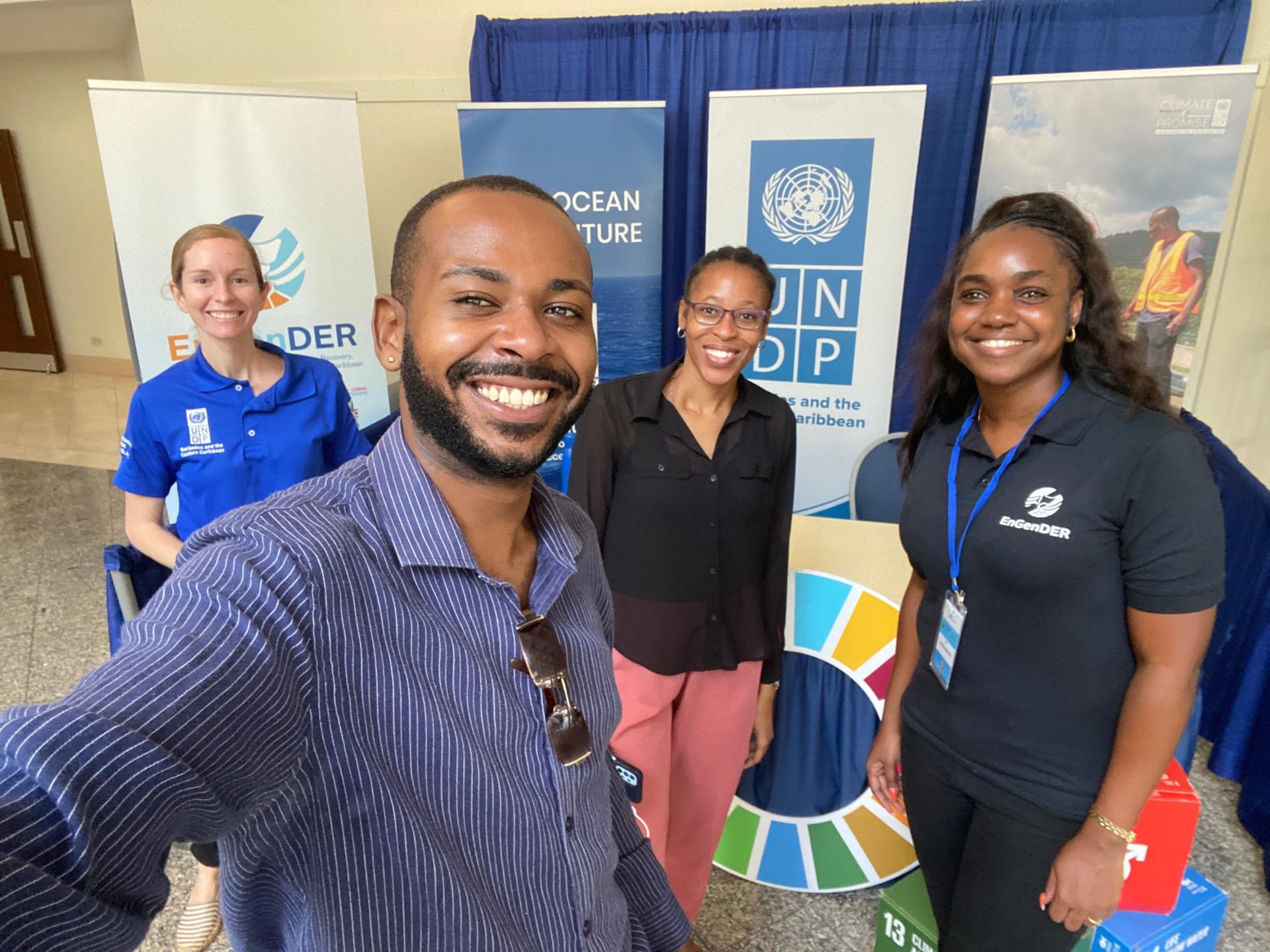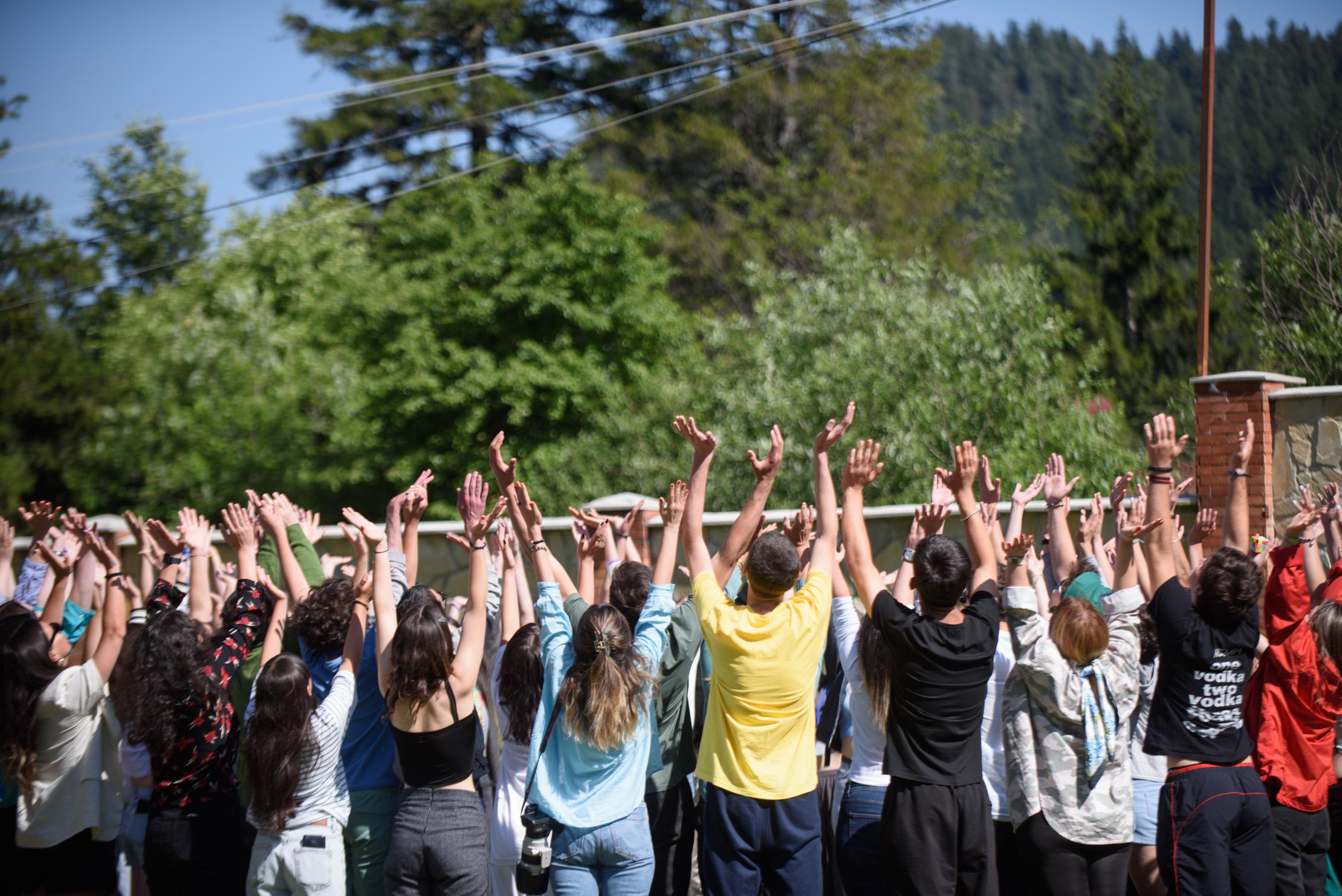
Foto: PNUD Barbados y Caribe Oriental
En el contexto de las negociaciones mundiales sobre el clima, el año 2025 representa un momento decisivo.
En virtud del Acuerdo de París, cada cinco años los países deben aumentar la ambición de sus Contribuciones Determinadas a Nivel Nacional (NDC, por sus siglas en inglés) para garantizar que sus compromisos climáticos nacionales limiten el aumento de la temperatura global por debajo de los 2 °C y alcancen, idealmente, el objetivo de 1,5 °C. La próxima revisión de las NDC está prevista para 2025 y, después de haber experimentado el año más caluroso del que se tiene registro, el resultado podría definir cómo será nuestro futuro.
Nadie está más comprometido con el futuro que la juventud. Mientras el mundo enfrenta la emergencia global y multidimensional que supone la pérdida de la naturaleza, la degradación ambiental y el cambio climático —factores que agravan aún más la desigualdad, la inseguridad, los conflictos y las crisis sanitarias—, la juventud se ve cada vez más amenazada por un futuro incierto. Pese a semejante panorama, los jóvenes se niegan a ser meros espectadores y se posicionan como catalizadores del cambio. De hecho, el auge global del movimiento juvenil por la justicia climática en los últimos años ha sido fundamental para impulsar la acción por el clima.
A medida que los países preparan la próxima revisión de sus NDC, resulta imprescindible procurar que la juventud tenga voz y participación real en la definición de la respuesta de la humanidad ante la crisis climática. La participación significativa de la juventud en la formulación de políticas (enlace en inglés) y su empoderamiento no son solo una necesidad, sino un derecho humano primordial, que está en sintonía con el derecho a un medio ambiente saludable (enlace en inglés). Por ello, es imperativo que las peticiones que la juventud plantea de manera legítima se escuchen y, además, se tomen en cuenta durante los procesos de revisión e implementación de las NDC.
Hoja de ruta para lograr la inclusión significativa de la juventud
A fin de apoyar a los países en la elaboración de políticas climáticas que aborden las necesidades y exigencias de la juventud, el PNUD ha creado On Equal Terms (disponible en inglés), una lista de verificación que ofrece orientación, puntos de partida y perspectivas para garantizar que los jóvenes participen y sean reconocidos en igualdad de condiciones con otras partes interesadas en los procesos de revisión de las NDC. La lista se desarrolló a partir de una encuesta global que se realizó a 335 jóvenes de 78 países, y se fundamenta en la vasta experiencia del PNUD trabajando con partes interesadas en cuestiones climáticas y organizaciones juveniles a nivel mundial.
Esta herramienta dinámica de verificación se adapta a los diversos contextos locales y proporciona sugerencias concretas sobre cómo los gobiernos pueden involucrar activamente a la juventud en las seis etapas clave del proceso de las NDC. A continuación, presentamos nuestras recomendaciones:
1. Demostrar compromiso político.
El primer paso para incluir de forma significativa a los jóvenes en los procesos de las NDC, o en cualquier política climática, consiste en adoptar un compromiso político claro para hacerlo. Tales compromisos, incluidos los vinculantes, ya han demostrado su eficacia. Un sorprendente 77,9 % de los jóvenes que participaron en nuestra encuesta indicaron no haber tenido ninguna participación en la formulación de la NDC de su país. Además, el 62,5 % percibió esta exclusión como un problema sistémico.
Es necesario un cambio fundamental de mentalidad entre los responsables de la toma de decisiones para que se reconozca a la juventud como agente del cambio y se considere su compromiso como esencial para impulsar y materializar la ambición climática. Los gobiernos deben tomar la decisión política de invitar a la juventud a participar en la elaboración de acciones, estrategias, decisiones y resultados del proceso de las NDC, al igual que deben destinar los recursos financieros, logísticos y técnicos necesarios para respaldar dichos esfuerzos.
2. Trazar un mapa de las diversas organizaciones juveniles.
A menudo, los mecanismos convencionales de participación de las partes interesadas seleccionan "por conveniencia" a las organizaciones o personas que intervendrán en las consultas sobre las NDC, en detrimento de otros grupos. Este proceso puede generar estructuras rígidas y jerárquicas de participación de la sociedad civil, además de acentuar la división entre grupos privilegiados y marginados.
Si se elabora un mapa de las organizaciones juveniles activas a nivel nacional, los gobiernos podrían identificar a los grupos infrarrepresentados y en situación de mayor vulnerabilidad, y brindarles así la oportunidad de participar de manera activa en el proceso. Establecer una estructura más inclusiva y representativa para la participación de la juventud, donde se consideren aspectos como el género, la raza, la etnia, la situación socioeconómica, la discapacidad y otros elementos de identidad que puedan limitar su acceso a la toma de decisiones, resulta esencial para fortalecer la legitimidad del proceso de las NDC.
3. Difundir la información.
La difusión de información sobre los procesos de las NDC suele realizarse de forma opaca y sin un enfoque proactivo de divulgación. Por ejemplo, las convocatorias abiertas a menudo se publican únicamente en el sitio web de la autoridad gubernamental correspondiente y no se divulgan ampliamente ni se dirigen a las diversas partes interesadas en cuestiones climáticas.
Para garantizar que los llamamientos a la participación en los procesos de las NDC lleguen a la mayor cantidad posible de jóvenes, es esencial que los gobiernos y otros actores empleen estrategias de divulgación que los alcancen en sus distintos ámbitos. Esta difusión debe hacerse en todas las lenguas de un país o territorio y en distintos formatos, tanto en línea como presencial. También se puede invitar a la juventud a colaborar en la creación de la convocatoria de participación y a difundirla entre sus propias redes.

Foto: Gela Bedianashvili/PNUD Georgia
4. Desarrollar la capacidad de la juventud para comprometerse.
Para asegurar que la juventud pueda contribuir con éxito al proceso de las NDC, los gobiernos deben asistirla en el desarrollo de los conocimientos técnicos y las capacidades necesarias para participar de forma eficaz. Nuestra encuesta arrojó que el 65 % de quienes habían participado previamente en los procesos de las NDC no consideraron que estas resolvieran satisfactoriamente las inquietudes y ambiciones de la juventud respecto a la acción climática.
Por lo tanto, la creación de capacidades y la formación son fundamentales para mejorar la calidad de la participación de la juventud tanto en la formulación como en la implementación de las NDC. Algunas de las opciones que los gobiernos pueden implementar en este sentido son soluciones de formación descentralizada y materiales didácticos que se ofrezcan a los jóvenes en sus propias localidades e idiomas, tales como videos pregrabados o sesiones dirigidas por funcionarios regionales y nacionales.
5. Crear y mantener un proceso inclusivo para el diseño de las NDC.
Una vez completados los pasos anteriores, llegamos a la fase más crucial del proceso: la consulta en sí. Dado que todos los países tienen que revisar sus NDC cada cinco años, es importante fomentar y reforzar el compromiso de la juventud en todo momento para garantizar su participación en la fase de diseño y consulta.
La confianza y la participación activa de la juventud en las consultas depende en gran medida de su capacidad para influir en el orden del día y en la selección de representantes en igualdad de condiciones con los organizadores. Al facilitar las consultas de manera efectiva, los gobiernos pueden aprovechar la oportunidad de recabar las perspectivas de la juventud, captar ideas que podrían no surgir en los procedimientos ordinarios y fomentar la confianza mutua.
Al mismo tiempo, los gobiernos deben asegurarse de que, tras las consultas, se informe claramente a la juventud participante sobre cómo se han incorporado sus aportes en el texto de la NDC.
6. Supervisar y rendir cuentas.
La transparencia también es un factor determinante para el éxito de un proceso inclusivo de las NDC. Incluir a la juventud en el seguimiento de su aplicación no solo mejora la transparencia y la rendición de cuentas, sino que también fomenta un mayor sentido de apropiación. Además, la juventud puede contribuir a la definición de indicadores de desempeño clave que permitan supervisar y evaluar los avances de las NDC.
Paralelamente, los gobiernos pueden crear mecanismos y canales para que los jóvenes señalen irregularidades, identifiquen áreas de mejora o compartan historias de éxito sobre la implementación de las NDC, lo cual debe hacerse de forma que se asegure su protección frente a represalias por compartir sus opiniones e inquietudes.
***
Los gobiernos y las partes interesadas a nivel global pueden utilizar la lista de verificación On Equal Terms para garantizar que la juventud participe plenamente en todas las fases de la revisión e implementación de las NDC. Los jóvenes líderes climáticos, los profesionales en el ámbito de la juventud y socios en el área del desarrollo pueden emplearla como herramienta de promoción para lograr una participación significativa de la juventud en la elaboración de políticas climáticas sostenibles e inclusivas para las generaciones venideras. Puedes descargar aquí la lista de verificación (disponible en inglés).
La iniciativa Climate Promise del PNUD ofrece la cartera de apoyo a la acción climática más amplia del sistema de las Naciones Unidas en más de 140 países. Ejecutada en colaboración con una amplia diversidad de socios, la iniciativa emblemática del PNUD Climate Promise ha apoyado a más de 120 países la mejora e implementación de sus Contribuciones Determinadas a Nivel Nacional (NDC), incluido mediante la promoción de la participación activa de la juventud en los procesos de revisión de dichas contribuciones. Esta iniciativa es sustentada con el generoso apoyo de los gobiernos de Alemania, Japón, Reino Unido, Suecia, Bélgica, España, Islandia, Países Bajos, Portugal y otros socios de financiamiento básico del PNUD, y sustenta la contribución del PNUD a la NDC Partnership.


